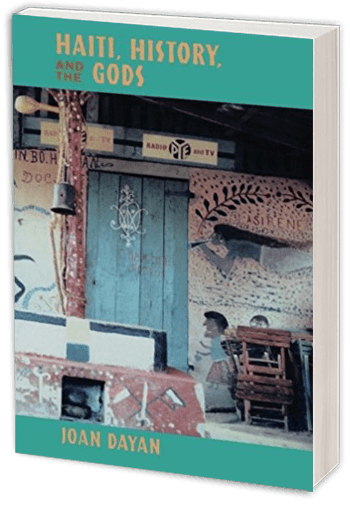 In Haiti, History, and the Gods, Joan Dayan charts the cultural imagination of Haiti not only by reconstructing the island’s history but by highlighting ambiguities and complexities that have been ignored. She investigates the confrontational space in which Haiti is created and recreated in fiction and fact, text and ritual, discourse and practice. Dayan’s ambitious project is a research tour de force that gives human dimensions to this eighteenth-century French colony and provides a template for understanding the Haiti of today.
In Haiti, History, and the Gods, Joan Dayan charts the cultural imagination of Haiti not only by reconstructing the island’s history but by highlighting ambiguities and complexities that have been ignored. She investigates the confrontational space in which Haiti is created and recreated in fiction and fact, text and ritual, discourse and practice. Dayan’s ambitious project is a research tour de force that gives human dimensions to this eighteenth-century French colony and provides a template for understanding the Haiti of today.
In examining the complex social fabric of French Saint-Domingue, which in 1804 became Haiti, Dayan uncovers a silenced, submerged past. Instead of relying on familiar sources to reconstruct Haitian history, she uses a startling diversity of voices that have previously been unheard. Many of the materials recovered here—overlooked or repressed historical texts, legal documents, religious works, secret memoirs, letters, and literary fictions—have never been translated into English. Others, such as Marie Vieux Chauvet’s radical novel of vodou, Fonds des Nègres, are seldom used as historical sources.
Dayan also argues provocatively for the consideration of both vodou rituals and narrative fiction as repositories of history. Her scholarship is enriched by the insights she has gleaned from conversations and experiences during her many trips to Haiti over the past twenty years. Taken together, the material presented in Haiti, History, and the Godsnot only restores a lost chapter of Haitian history but suggests necessary revisions to the accepted histories of the New World.
Reviews
“Dayan uses a multifaceted methodology, including careful historical, anthropological, and literary analysis. She paints a frightening portrait of colonial Haiti from legal and religious texts, memoirs, letters, and literary fiction. . . . The light Dayan shines on race, gender, and religion illumines the path from the slave trade to the drug trade to the boat people. . . . She tells the same story three ways: using ritual, fiction, and history. . . . An intriguing way to wander through Haiti’s ‘cultural imagination.’ . . . She evokes a deeply felt mood of Haiti’s past and present.” — Commonwealth
“Dayan’s book is a brilliant breakthrough in Haitian historiography. She has done for the understanding of the Haitian mind what Perry Miller did for the understanding of the Puritans in his New England Mind (1939).” — Thomas O. Ott, American Historical Review
“Joan Dayan has written a strange and wonderful book. [It] will be hard to put down once started, so intense and impassioned it is. It is a composite essay that insists on its own unstable, hybrid form. . . . It is also a love-letter to a place and a people, in which the personal surfaces with the unanswered questions of the familiar past. . . . Whether they agree with it or not, future scholars will have to position themselves with regard to a work that meticulously deconstructs every single assumption, upends every single image outsiders have ever held for the past two hundred years about the island, its history, its belief system.” — Clarisse Zimra, Research in African Literatures
“There is much that historians can learn from Dayan’s approach to historical sources. . . . Because she sees herself as exploring a ‘history beyond the reach of written history,’ she has successfully reached for nonwritten sources and found a very revealing one in Haitian voodoo. . . . Her use of popular historical interpretation to complicate nationalist and state representations of revolution will be of interest to scholars of other countries in the region, and perhaps especially to students of Mexico and Cuba.” — Ada Ferrer, Historian
“[A] provocative and demanding book. . . . revealing how Haiti and its history came to reflect a series of particularly European and, more specifically, French preoccupations. . . . Dayan’s far-reaching mix of historiography and textual analysis is not confined to foreign perceptions of Haiti, in which the old demons of race, colour, sexual fetishisation, and bondage fantasies crop up relentlessly. She is also interested in trying to reconstruct a more authentically Haitian sense of Haitian history, exploring popular legends, songs, and other elements of a culture where voodoo plays a central role. . . . This is a complex and sophisticated study.” — James Ferguson, The Institute of Race Relations/Race and Class